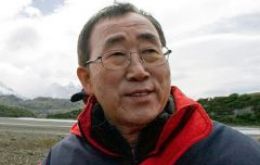MercoPress. South Atlantic News Agency
International
-
Tuesday, June 8th 2010 - 18:42 UTC
Spanish judges and prosecutors visit Gibraltar to foster professional contacts

A group of Spanish judges and prosecutors paid a historic first visit to Gibraltar’s courts on Monday. This was the second part of a cross-border initiative that aims to foster professional contacts between judges on both sides of the Bay of Gibraltar, reports the Gibraltar Chronicle.
-
Tuesday, June 8th 2010 - 11:26 UTC
Pound falls as Fitch warns of UK's ‘formidable’ debt challenge

The pound fell in late morning deals after credit ratings agency Fitch warned the debt challenge facing the UK government was 'formidable', and that cuts would have to be deeper and quicker than former chancellor Alistair Darling had planned.
-
Tuesday, June 8th 2010 - 05:47 UTC
Germany and UK deciding drastic budget cuts; fears in the rest of Europe

German Chancellor Angela Merkel is holding a special, two-day cabinet meeting to come up with a savings plan for the country's budget. Berlin wants to rein in its deficit to meet European Union rules, as a sovereign-debt crisis has hit markets and the Euro in the past few months.
-
Tuesday, June 8th 2010 - 05:42 UTC
World Ocean Day 2010: opportunities and challenges

The United Nations Organization (UN) celebrates on Tuesday 8 June World Ocean Day under the theme: 'Our oceans: opportunities and challenges'. The UN General Assembly instituted this celebration from 2009, by its resolution 63/111, issued 5 December, 2008.
-
Tuesday, June 8th 2010 - 00:43 UTC
Forum on how to recover funds stolen by dictators and corrupt regimes

United Nations, the World Bank and Switzerland are organizing a two-day international conference in Paris to try and associate global financial centres in helping recover assets taken and hidden by dictators and other leaders of corrupt regimes.
-
Monday, June 7th 2010 - 10:53 UTC
Weakening Euro “good for Europe”; 1 Euro/ US dollars parity “not far”

French Prime Minister Francois Fillon said that the weakening Euro was good for Europe. “I currently see only good news regarding the euro-dollar exchange rate” Fillon said at a press conference in Paris with Canadian Prime Minister Stephen Harper.
-
Monday, June 7th 2010 - 09:25 UTC
G-20 fails to reach consensus on proposal to impose global tax on banks

The Group of 20 nations failed over the weekend to agree on a proposal to impose a global tax on banks that was aimed at making the financial industry shoulder the cost of bailouts, settling instead for a common set of guidelines.
-
Saturday, June 5th 2010 - 05:16 UTC
IMF ‘emergencies department’ to visit Hungary next Monday

The IMF is sending a senior official to Hungary for talks with the new government early next week, amid rising concerns about the country's public finances.
-
Saturday, June 5th 2010 - 00:43 UTC
Wales will have the largest offshore wind farms in the world

Construction work will begin next year on one of the largest offshore wind farms in the world, an energy firm has announced. The £2 billion Gwynt y Mor wind farm will have 160 wind turbines around 10 miles off the north Wales coast near Colwyn Bay and Llandudno.
-
Friday, June 4th 2010 - 22:44 UTC
Soy consumption could help with prostate cancer and baldness, say scientists

Scientists have claimed that eating soy could help prevent men from developing prostate cancer and from going bald. US researchers found a molecule produced in the intestine when soy is digested stops a hormone which can fuel prostate growth or cause baldness.
